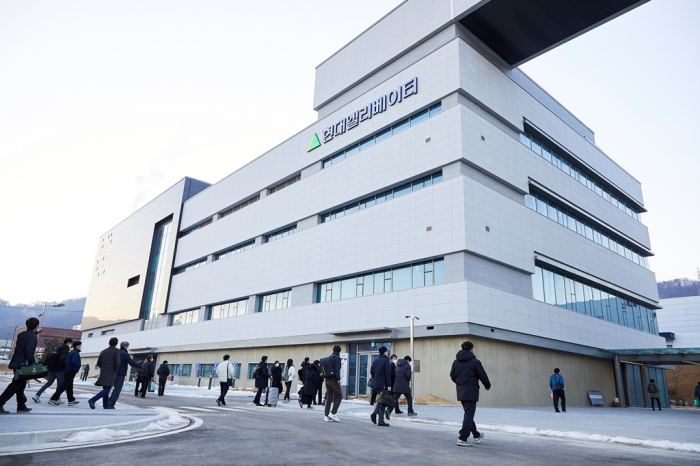Corporate strategy
Hyundai Elevator aims to more than double sales by 2030
South Korea’s top elevator maker will strive to expand globally, especially in Indonesia and Vietnam to raise sales to $3.8 bn
By Jul 13, 2022 (Gmt+09:00)
2
Min read
Most Read
LG Chem to sell water filter business to Glenwood PE for $692 million


KT&G eyes overseas M&A after rejecting activist fund's offer


Kyobo Life poised to buy Japan’s SBI Group-owned savings bank


StockX in merger talks with Naver’s online reseller Kream


Meritz backs half of ex-manager’s $210 mn hedge fund



CHUNGJU, North Chungcheong Province -- Hyundai Elevator Co., South Korea’s top elevator maker, aims to more than double its sales in the next eight years, expanding overseas markets with next-generation products applied with new technologies such as artificial intelligence and the internet of things.
The holding company of local conglomerate Hyundai Group Co. on Wednesday unveiled its goal to raise sales to 5 trillion won ($3.8 billion) by 2030 from 2 trillion won last year. To meet the target, the company plans to work on five strategies – digital transformation, innovative product development, overseas business expansion, service business portfolio expansion and the launch of new mobility businesses.
Hyundai Elevator aims to raise overseas sales to 50% of total revenue by then from the current 20%, targeting emerging markets, especially Indonesia and Vietnam.
“We plan to expand key markets to the Middle East, and to both North America and South America after next year,” said Hyundai Elevator CEO Cho Jae-cheon.
TO EXPAND CAPACITY
Hyundai Elevator said it will increase its capacity to 35,000 units a year from the current 25,000 by 2028 at its plant in Chungju, about 140 kilometers southeast of Seoul.
The facility is a smart factory that integrates all processes including production, packaging and shipment. The company, which moved its headquarters to Chungju, raised the factory’s automation rate to 78% with new technologies such as the industrial internet of things and big data. In particular, robots complete the entire elevator door production process at the factory.
“The Chungju smart factory will raise our annual production capacity by some 25% while improving productivity to enhance cost competitiveness,” said a company official.
In April, its logistics subsidiary Hyundai Movex Co. commercialized an elevator only for robots, which robots can call and get in or out on their own through the cloud and 5G-based intelligence systems.
“We are developing an elevator with a higher level of technology and can unveil it in the second half of this year,” Hyundai Elevator CEO Cho said.
Meanwhile, Cho expressed concerns over the surging prices of raw materials such as steel and concrete, calling the situation “serious.”
“It has hurt our operating profit since the elevator sector needs a lot of steel,” he said. “We are preparing measures considering not only raw materials but also the market situations at home and abroad, as well as political conditions. We are also continuously in talks with shareholders about raising sales prices.”
Write to Jeong Min Nam at peux@hankyung.com
Jongwoo Cheon edited this article.
More to Read
-

-
 Korean chipmakersSamsung in talks to supply customized HBM4 to Nvidia, Broadcom, Google
Korean chipmakersSamsung in talks to supply customized HBM4 to Nvidia, Broadcom, Google20 HOURS AGO
-
 EnergyLS Cable breaks ground on $681 mn underwater cable plant in Chesapeake
EnergyLS Cable breaks ground on $681 mn underwater cable plant in ChesapeakeApr 29, 2025 (Gmt+09:00)
-
 Business & PoliticsUS tariffs add risk premium to dollar assets: Maurice Obstfeld
Business & PoliticsUS tariffs add risk premium to dollar assets: Maurice ObstfeldApr 29, 2025 (Gmt+09:00)
-

Comment 0
LOG IN


